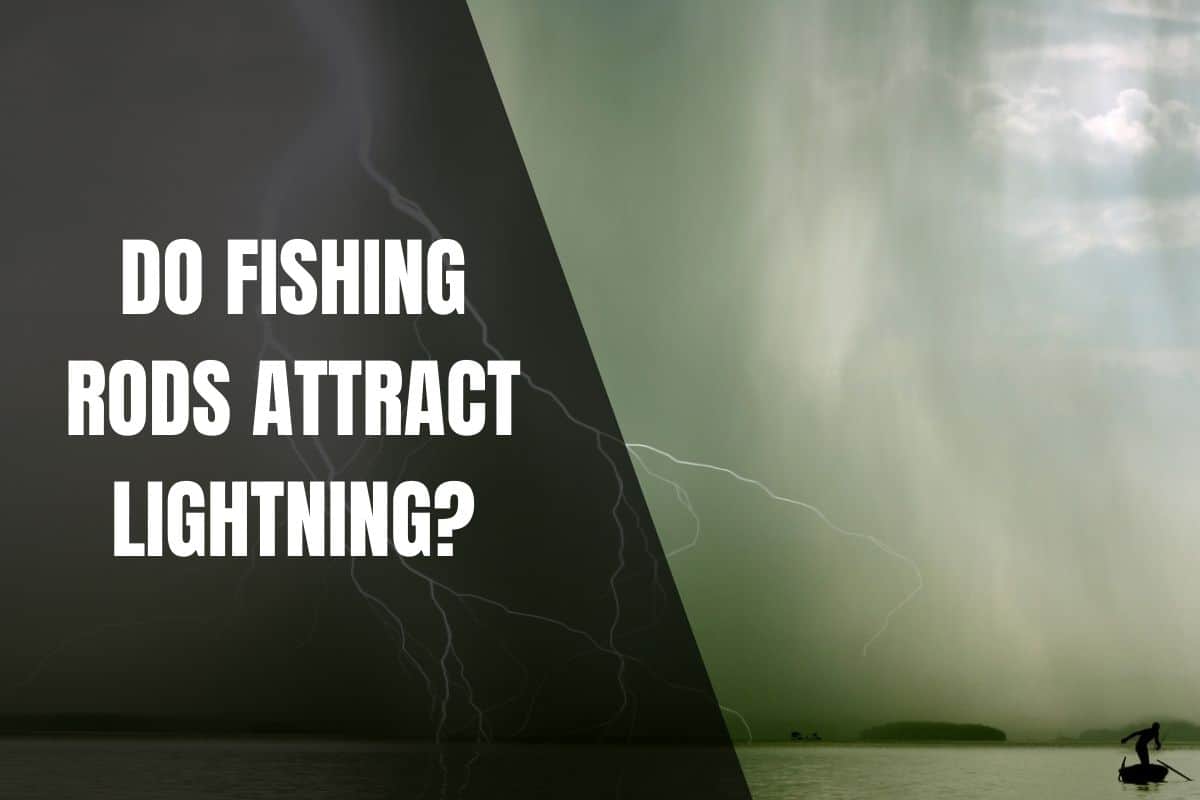Anyone who has fished has encountered bad weather, which often includes contending with lightning. That reality prompts a question just about every angler has had … Do fishing rods attract lightning?
Fishing rods made from carbon fibres, graphite, fibreglass, and wood don’t conduct electrically. Therefore, your fishing rod will not attract lightning. Even though fishing rods don’t attract lightning, there is always a risk of being hit by lightning if fishing during a lightning storm.

What Attracts Lighting To Fishing Rods?
Lightning is not attracted to your fishing rods, no matter their composition. When lightning strikes a rod or angler, a few things have happened:
- The angler or pole was in the path of the lightning
- Either provided the path of least resistance to the ground
- Both provided a convenient target because they were the only things around comparatively
How Lightning Works
Understanding why your fishing rod does not attract lightning starts with understanding how lightning works.
Lightning is simply a spark of electricity between clouds, the air, or the ground. The air serves as an insulator between positive and negative charges.
Eventually, if the charges build, they overwhelm the insulator, and a rapid discharge of electricity occurs. This discharge can happen between clouds to ground and cloud to cloud.
Lightning Misconceptions
There are a lot of common misconceptions regarding lightning and lightning and fishing rods. Here are a few:
Lightning Is Attracted to Objects
When lightning strikes a fishing rod, it does so because the rod is the easiest path for the lightning to take to get to the ground. The angler and fishing rod is the only easily strikeable objects on a boat or lakeshore in many cases. If lightning strikes in that area, it will likely go through the easiest pathway to the ground.
That is also why you should never walk across a field in a lightning storm or if you hear thunder, no matter how far off it sounds.
Lightning Strikes the Tallest Object
Lightning strikes wherever the path of least resistance exists that is also in the pathway of the lightning discharge. Often, that is the tallest object around, but not always. Even if you are around trees or there is ground that is higher than you, do not assume you are safe.
Lying Flat on the Ground Will Save You
Not necessarily. A lightning strike can travel as far as 100 feet from the strike, so laying down exposes more of your body to a shock. You can crouch on two feet and curl up as much as possible to present a small target, but even that will not guarantee you are safe from a lightning strike.
The smartest advice is to get inside or to a hard-topped structure.
Lightning Will Not Strike the Same Place Twice
Lightning will strike wherever the path of least resistance exists. If, after a lightning strike, an object remains the least resistant path, it could be struck again. Often, that is the case.
FAQ
Is there a number of rods that starts to attract lighting?
No. lightning can strike a single fishing rod or person if the environment is right.
How does the risk of being hit by lightning increase?
To a certain extent, being on a shoreline or boat can make you a more probable target. Other than that, lightning can strike anywhere. Indirectly, not taking precautions increases your risk of getting struck.
What should you stay away from to reduce risk?
The issue is not to stay away from something to reduce risk so much as the goal is to take steps to manage your risk. Lay your fishing rod down horizontally. Get to shelter if possible.
If getting to shelter is not possible because you are on a boat, get to shore. If you are onshore and cannot get to shelter, create as small a target of yourself as possible.
How to protect yourself (gloves, boots, rod coverings, etc.)?
The best protection is to get to a place of safety. Each lightning bolt contains about one billion volts and 10,000 to 20,000 amperes of current with an ambient temperature of 18,000 to 60,000 degrees Fahrenheit.
If lightning strikes your fishing pole or you, what you have on will not protect you.
Can lightning strike if no storm is present?
Yes. The general rule is that you can get struck by lightning if you can hear thunder. So if you hear thunder, get off the water and to safety.
Will taking shelter in the woods provide protection from lightning?
No. If a tree in that woods is tall and offers the path of least resistance, lightning can strike it again, and the current can travel up to 100 feet away from the tree.
Happy Fishing & Tight Lines
